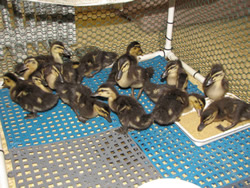The Mystery of the Christmas Ducklings
by R.Schubert, Director of Wildlife Rehabilitation
 Although we're still busy during the winter, wildlife rehabilitation generally slows down a bit for the months of November through February. This year, however, has been full of action! Great Blue Herons, Screech Owls, Cooper's Hawks, Red Foxes, Snapping Turtles, migratory songbirds, and even some bats!
Although we're still busy during the winter, wildlife rehabilitation generally slows down a bit for the months of November through February. This year, however, has been full of action! Great Blue Herons, Screech Owls, Cooper's Hawks, Red Foxes, Snapping Turtles, migratory songbirds, and even some bats!
One of our more memorable patient intakes was 15 newly hatched baby Mallard ducklings dropped off on December 23. They came to us from PACCA, and had no story attached to them, having been left at PACCA's headquarters on Hunting Park Avenue. As Philadelphia's animal control service, PACCA and SPCA deal mainly with dogs and cats, and defer wildlife issues to the Schuylkill Center, because we possess the proper U.S. Fish and Wildlife and PA Game Commission licenses as well as the expertise to deal with these animals. However, we were stumped by these 15 frozen little "ducksickles" left in our care. As you may know, Mallards lay their eggs in spring and summer, when temperatures are suitable for raising babies outdoors. Were these Christmas ducklings a sign of global warming? Were they some symptom of nature out of balance? Were they possibly rouens, a domestic version of the Mallard bred for restaurant meat, that someone had turned loose outside? We may never know.
(The Quill, Christmas Ducklings continued)
What we did know was that they needed immediate care...and the issue that was first in priority was body temperature. When an animal, even a human, is hyperthermic, the basic rule of first aid is that you cool them down quickly. But these animals were hypothermic, and needed to be slowly thawed and warmed back up, to prevent a drop in blood pressure and hypovolemic shock. Fortunately, we have 7 isolette incubators at the Clinic for just such an emergency. Over the course of an hour we were able to thaw out the Christmas Ducklings in our nursery and assess their hydration status. However, they quickly decided they could take care of themselves, and by the end of the day they were eating us out of house and home! They were so ravenous, it seemed like every hour we were refilling their food and water bowls. We feed baby mallards a domestic poultry mash called start-n-gro, but we dilute it with whole oats, because too much protein causes growth deformities in wild mallards. To this mixture we add finely chopped greens for a little variety, as well as some live mealworms to spark their interest. They seemed to double in size in just a few days, and we've moved them to larger facilities down the hall in our Waterfowl Room. While the mystery of the Christmas Ducklings may never be solved, we at least know they'll be healthy and safe.
Support The Clinic through Igive
